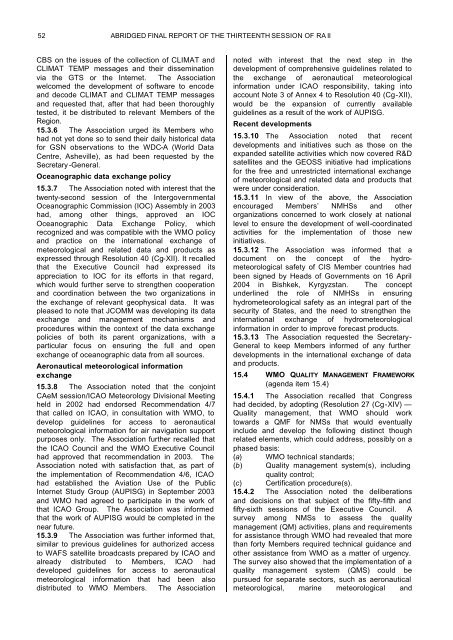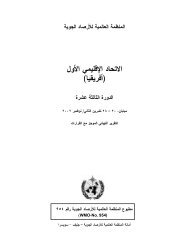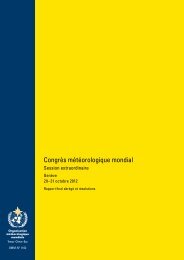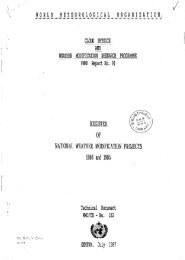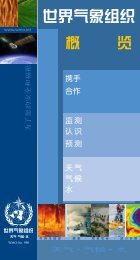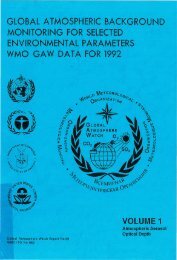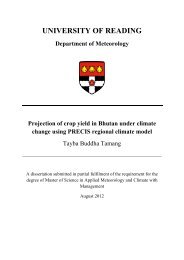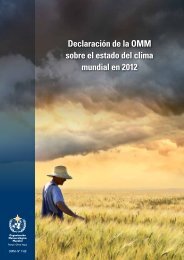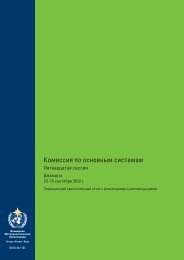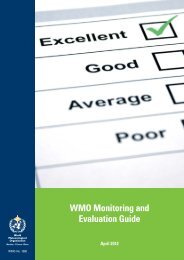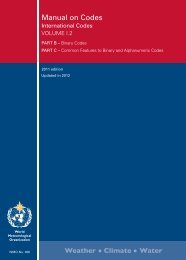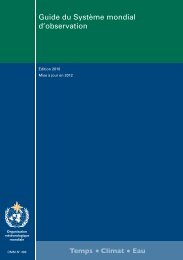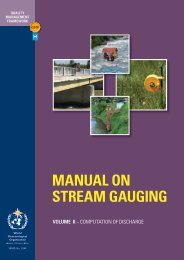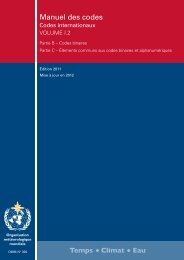Regional Association II (ASIA) - E-Library - WMO
Regional Association II (ASIA) - E-Library - WMO
Regional Association II (ASIA) - E-Library - WMO
You also want an ePaper? Increase the reach of your titles
YUMPU automatically turns print PDFs into web optimized ePapers that Google loves.
52 ABRIDGED FINAL REPORT OF THE THIRTEENTH SESSION OF RA <strong>II</strong>CBS on the issues of the collection of CLIMAT andCLIMAT TEMP messages and their disseminationvia the GTS or the Internet. The <strong>Association</strong>welcomed the development of software to encodeand decode CLIMAT and CLIMAT TEMP messagesand requested that, after that had been thoroughlytested, it be distributed to relevant Members of theRegion.15.3.6 The <strong>Association</strong> urged its Members whohad not yet done so to send their daily historical datafor GSN observations to the WDC-A (World DataCentre, Asheville), as had been requested by theSecretary -General.Oceanographic data exchange policy15.3.7 The <strong>Association</strong> noted with interest that thetwenty-second session of the IntergovernmentalOceanographic Commission (IOC) Assembly in 2003had, among other things, approved an IOCOceanographic Data Exchange Policy, whichrecognized and was compatible with the <strong>WMO</strong> policyand practice on the international exchange ofmeteorological and related data and products asexpressed through Resolution 40 (Cg-X<strong>II</strong>). It recalledthat the Executive Council had expressed itsappreciation to IOC for its efforts in that regard,which would further serve to strengthen cooperationand coordination between the two organizations inthe exchange of relevant geophysical data. It waspleased to note that JCOMM was developing its dataexchange and management mechanisms andprocedures within the context of the data exchangepolicies of both its parent organizations, with aparticular focus on ensuring the full and openexchange of oceanographic data from all sources.Aeronautical meteorological informationexchange15.3.8 The <strong>Association</strong> noted that the conjointCAeM session/ICAO Meteorology Divisional Meetingheld in 2002 had endorsed Recommendation 4/7that called on ICAO, in consultation with <strong>WMO</strong>, todevelop guidelines for access to aeronauticalmeteorological information for air navigation supportpurposes only. The <strong>Association</strong> further recalled thatthe ICAO Council and the <strong>WMO</strong> Executive Councilhad approved that recommendation in 2003. The<strong>Association</strong> noted with satisfaction that, as part ofthe implementation of Recommendation 4/6, ICAOhad established the Aviation Use of the PublicInternet Study Group (AUPISG) in September 2003and <strong>WMO</strong> had agreed to participate in the work ofthat ICAO Group. The <strong>Association</strong> was informedthat the work of AUPISG would be completed in thenear future.15.3.9 The <strong>Association</strong> was further informed that,similar to previous guidelines for authorized accessto WAFS satellite broadcasts prepared by ICAO andalready distributed to Members, ICAO haddeveloped guidelines for access to aeronauticalmeteorological information that had been alsodistributed to <strong>WMO</strong> Members. The <strong>Association</strong>noted with interest that the next step in thedevelopment of comprehensive guidelines related tothe exchange of aeronautical meteorologicalinformation under ICAO responsibility, taking intoaccount Note 3 of Annex 4 to Resolution 40 (Cg-X<strong>II</strong>),would be the expansion of currently availableguidelines as a result of the work of AUPISG.Recent developments15.3.10 The <strong>Association</strong> noted that recentdevelopments and initiatives such as those on theexpanded satellite activities which now covered R&Dsatellites and the GEOSS initiative had implicationsfor the free and unrestricted international exchangeof meteorological and related data and products thatwere under consideration.15.3.11 In view of the above, the <strong>Association</strong>encouraged Members’ NMHSs and otherorganizations concerned to work closely at nationallevel to ensure the development of well-coordinatedactivities for the implementation of those newinitiatives.15.3.12 The <strong>Association</strong> was informed that adocument on the concept of the hydrometeorologicalsafety of CIS Member countries hadbeen signed by Heads of Governments on 16 April2004 in Bishkek, Kyrgyzstan. The conceptunderlined the role of NMHSs in ensuringhydrometeorological safety as an integral part of thesecurity of States, and the need to strengthen theinternational exchange of hydrometeorologicalinformation in order to improve forecast products.15.3.13 The <strong>Association</strong> requested the Secretary-General to keep Members informed of any furtherdevelopments in the international exchange of dataand products.15.4 <strong>WMO</strong> QUALITY MANAGEMENT FRAMEWORK(agenda item 15.4)15.4.1 The <strong>Association</strong> recalled that Congresshad decided, by adopting (Resolution 27 (Cg-XIV) —Quality management, that <strong>WMO</strong> should worktowards a QMF for NMSs that would eventuallyinclude and develop the following distinct thoughrelated elements, which could address, possibly on aphased basis:(a) <strong>WMO</strong> technical standards;(b) Quality management system(s), includingquality control;(c) Certification procedure(s).15.4.2 The <strong>Association</strong> noted the deliberationsand decisions on that subject of the fifty-fifth andfifty-sixth sessions of the Executive Council. Asurvey among NMSs to assess the qualitymanagement (QM) activities, plans and requirementsfor assistance through <strong>WMO</strong> had revealed that morethan forty Members required technical guidance andother assistance from <strong>WMO</strong> as a matter of urgency.The survey also showed that the implementation of aquality management system (QMS) could bepursued for separate sectors, such as aeronauticalmeteorological, marine meteorological and


